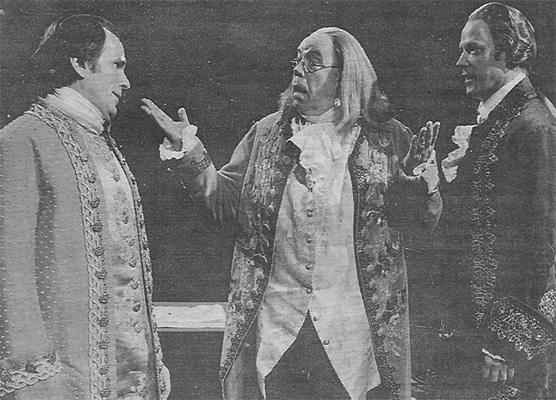|
Who
knew that the Founding Fathers could sing and dance?
Perhaps a more accurate question might be: Who knew before Sherman
Edwards and Peter Stone's musical 1776
debuted on Broadway in 1969, that John Adams, Thomas Jefferson,
Benjamin Franklin and the rest of the signers of the Declaration
of Independence could carry a tune and step lightly?
Actually, other than presenting the historical fact that Jefferson
really did play the violin, 1776,
the Tony Award-winning musical that will open Tuesday night and
conclude the 2007 Musical Circus season, plays fast and loose with
music and dance history.
But the play is quite accurate in its depiction of the Continental
Congress, the group of men gathered in Philadelphia to represent
America's 13 colonies as they debated their future relationship
with Mother England and drafted the Declaration of Independence.
The Bee recently talked with Adams, Jefferson and
Franklin -- or more accurately , the actors James Brennan, Matthew
Ashford and Conrad John, Schuck, respectfully -- about 1776,
their characters and America history.
"The play was the first to resuscitate John Adams' reputation,"
says Brennan, a Music Circus favorite who has starred in My
Fair Lady, Camelot and Damn, Yankees,
among many credits.
Adams, a major figure in Boston revolutionary politics, a
leader in the debate over independence at the Continental Congress,
an ambassador to France and the second president of the United States,
had become a relatively forgotten founder by the 1960s.
"It was known only to die-hard Revolutionary scholars that
he was a prime mover in the Revolution," Brennan says. "Because
his presidency was so unpopular, it squelched his legend."
Brennan points out the irony that "a musical comedy started
the Adams resurgence," which included the PBS miniseries
The Adams Chronicles and, more recently, best selling histories
by David McCullough and Joseph Ellis.
Adams is usually portrayed as a cranky man to whom Franklin says,
"Nobody listens to you. You're obnoxious and disliked.
So how does Brennan play him?
"Obnoxious and disliked," says Brennan, adding, "you
can't be afraid of that" as an actor. "But he gets to
show his terribly human side with (wife) Abigail and in his scenes
with Martha Jefferson."
It's a "daunting" task to play such an illustrious historical
figure as Jefferson, says Ashford, who has appeared in several productions
of 1776 but is best know,
since 1989 [sic] for playing Jack Deveraux in the popular daytime
soap opera Days of Our Lives. (Ashford says his Days
character is "in England right now" but he will be
return.)
Ashford hopes to guard against portraying Jefferson as a "superman
on a pedestal" or a "demigod... given the magnitude of
what he and these guys did."
Like Brennan, Ashford has studied historical works about his character,
citing Joseph Ellis' books as examples.
But what he really appreciates about 1776,
is that the play shows personal life and feelings of Jefferson.
"He has a young wife and he just wants to go home (to be with
her)," says Ashford. "He's ready to chuck it. That's a
major humanizing fact."
And he recognizes what's special about acting in 1776:
"We get a chance to do something most people never get a chance
to do -- to step inside history."
The message of 1776 has always
appealed to Schuck, who saw the musical in its original Broadway
production.
"The material blew me away," Schuck says. "That someone
could put all this information in theatrical form was marvelous.
It defines what being an American is in a really good way."
Schuck has played Franklin onstage before, but this will be his
first Sacramento appearance. Yet he will be instantly recognized
by local audiences from his many performances in movies and on TV.
(The actor is now using his birth name, Conrad John Schuck, instead
of just John Schuck.)
He played Painless the dentist in Robert Altman's M*A*S*H
and Sgt. Charles Enright on McMillan and Wife, among
many roles. He's also starred in two Broadway productions of Annie
(as Oliver Warbucks) and has appeared frequently in revival tours
of the musical, which he calls "my working annuity."
Yet after nearly 40 years of screen and TV credits, Schuck describes
musical comedy as "the inspiration for my career." He
remembers wanting to become an actor ever since his parents took
him to see Oklahoma! on Broadway, where, ironically,
Howard Da Silva, the actor who originated the part of Benjamin Franklin
in 1776, was portraying
Jud Fry.
Like has fellow 1776, actors,
Schuck has researched his character in history books, and considers
them "helpful in find the little moments in Franklin's life."
The amiable Schuck delights in the play's "witty and joyous
nature," and readily quotes one of Franklin's best lines: "Treason
is a charge invented by the winners as an excuse for hanging the
losers."
He follows the lead of Franklin himself in his portrayal, noting
that the great man said, "We're men, not demigods."
|

